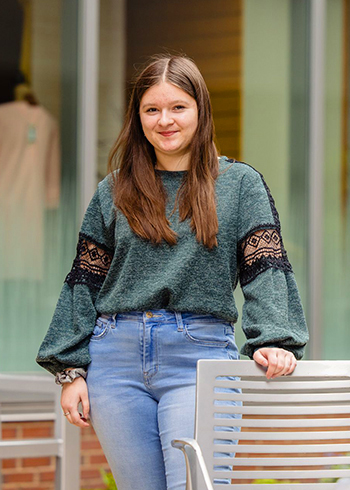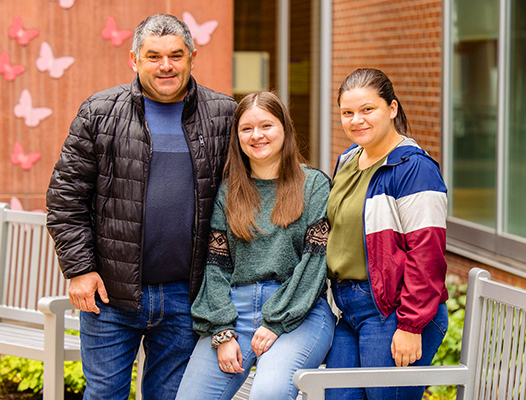Oleksandra Zakharchyshyn
Persevering Through Loss: Family Support and Skilled Care Helps Teen Fully Recover from Tragedy
On June 20, shortly after 8 p.m, Nelya Leskiv got the kind of news no one ever wants to get: several members of her extended family had been walking on the shoulder of Empire Boulevard toward to the Abbotts’ Custard shop in Webster, NY, when a distracted driver collided into them.
 “It wasn’t clear who was in the hospital or how bad the injuries were,” said Nelya.
“It wasn’t clear who was in the hospital or how bad the injuries were,” said Nelya.
On the date of the Summer Solstice, Nelya was faced with a long, chaotic night.
She found out four of her family members had been injured, and transported to both University of Rochester Medical Center and Rochester General Hospital. But since her extended family spoke limited English (they had emigrated from Western Ukraine just five months earlier), it was difficult for caregivers to identify them immediately. In addition, COVID visiting restrictions meant that she couldn’t freely enter either hospital.
Nelya scrambled from hospital to hospital until – slowly – details began to emerge. Nelya’s cousin, Mariana Zakharchyshyn — who had been admitted at Strong Memorial Hospital along with her three-year-old son Maksym Tsybrii — had not suffered serious injuries. Mariana had been able to write down her name.
Tragically, however, Oksana Zakharchyshyn, Mariana’s mother and Nelya’s aunt, had died from her injuries.
Nelya also found out that Mariana’s 16-year old sister, Oleksandra Zakcharchyshyn, was fighting for her life at Rochester General Hospital (RGH).
Getting Through the Worst
Nelya’s young cousin, Oleksandra, had been admitted to RGH without identification, credit cards, or a phone. She was entered in the system as “unknown.” Caregivers didn’t have time to figure who she was, however, as she needed immediate surgery. The artery behind one of her knees was completely ruptured, and she was at risk of either losing her leg or bleeding to death. It took surgeons six hours to reconstruct the artery and create a graft to repair the vein.
During surgery, RGH caregivers were able to confirm Oleksandra’s identify her through her type 1 diabetes condition.
“They saved her life over there,” said Jake Deines, M.D. associate professor in the Division of Pediatric Critical Care at GCH.
Once she had figured out what happened, Nelya picked up Oleksandra’s dad, Ihor — in shock from the loss of his wife, Oksana — and brought him to visit his daughter.
They arrived to find her in rough shape even with the successful surgery. “I wasn’t expecting her to see her in such a bad condition. For the first 3 or 4 days, she wasn’t able to move anything at all,” said Nelya.
Oleksandra was transferred to the GCH Pediatric Intensive Care Unit (PICU) for her recovery. Deines, along with a team of colleagues, worked to coordinate her care.
“She had a lot of broken bones, from hip to ribs to neck, and she needed anti-coagulation drugs and constant administration of pain medicine and sedatives,” said Deines. To make matters worse, on the second night at GCH, Oleksandra began bleeding internally from an unknown source. Imaging revealed that she had a hematoma spinal area that had to be drained to avoid neurological damage.
The totality of her conditions - broken bones, internal bleeding, and neurological damage - required multidisciplinary collaboration for her recovery. Orthopedic surgery was needed to repair her broken bones. Vascular surgery was required to graft veins that were injured, and the neuro-surgery team worked to stabilize her spine.
While teams were maneuvering to facilitate Oleksandra’s long road to recovery, Nelya remained a constant presence — along with Ihor — to help advocate for her cousin’s care. Through those initial weeks in the PICU, however, they had made the decision not to tell Oleksandra about her mother’s death because she was not in a physical condition to even understand the news, much less process it psychologically.
About two-and-a-half weeks later, following several successful surgeries, Oleksandra was able to be transferred out of the PICU and onto the 8th floor general ward for further healing and pain control. At this point, Nelya and Ihor decided to break the news about her mother.
“There was basically no emotions. She listened, but didn’t respond,” said Nelya, “the psychologist said that she was in so much physical pain, she had to shut the emotional pain off to fight for her life.”
Moving Forward — Physically and Psychologically
After getting through the worst of her injuries, Oleksandra still faced a difficult path to full recovery.
Douglas Fetkenhour, M.D. associate professor of clinical medicine & rehabilitation, lead Oleksandra’s rehabilitation and physical therapy efforts after she was transferred out of the PICU. The most critical challenge was determining if she could walk again. Due to the spinal injury, her legs were weak, and she would have to start from square one.
Fortunately, Fetkenhour knew from experience that her type of spinal injury would allow for some recovery of motor skills. “There isn’t much that can be done from a medication, procedure or rehab perspective that accelerates true neurologic recovery,” he said. “We expect people to get stronger, but it’s a slow, long road, and that’s why we make sure to help patients learn the basic things that they can do on a given day,” he said.
Oleksandra began her recovery literally one-inch-at-a-time, starting by working on rolling over in bed or getting to the edge of the bed. The process took its mental toll; the first time the rehab team tried to move her out of the bed, she had a panic attack, and the physical pain from her injuries made each movement extremely difficult.
As the days progressed, however, Oleksandra — strengthened by the support of Nelya and her father— started to gain her strength back.
“She found a way through the tears and the pain,” said Nelya, “She realized that she had to do it because if you lose time you cannot recover. When she made progress she was so happy and encouraged.”
 Fetkenhour credits Oleksandra’s support system for facilitating a faster-then-expected recovery, as well as her inner-strength in recovering from the immediate tragedy. “We were anticipating a timeframe from weeks to months, but she was showing a recovery from days to weeks. Over time, we were able to find new things to work on. A big part of her progress was due to the support of her family and the disciplinary team. She showed an incredible amount of resilience from an emotional perspective.”
Fetkenhour credits Oleksandra’s support system for facilitating a faster-then-expected recovery, as well as her inner-strength in recovering from the immediate tragedy. “We were anticipating a timeframe from weeks to months, but she was showing a recovery from days to weeks. Over time, we were able to find new things to work on. A big part of her progress was due to the support of her family and the disciplinary team. She showed an incredible amount of resilience from an emotional perspective.”
After six weeks, Oleksandra was able to walk with assistance. While she would need to utilize a wheelchair and walker for a while, she reached the point where she could perform basic daily tasks with a minimum of help. She was discharged from the hospital soon afterward.
Her father and cousin were huge advocates for her. When it came time for her to be discharged, they called the nurses together from all the different units who had cared for her to come and see the progress she had made, and to celebrate with her as she walked out of the hospital,” said Amy Keller, nurse manager on the 8th floor.
Recovery — and a Model for the Future
Bolstered by the support of her family, Oleksandra has now recovered to the point where she can walk on her own. She spends her current days getting remote instruction from Webster High School with additional assistance from an ESL tutor to work on her English. Nearly a year afterward, she is settling into the kind of American life she imagined when her family emigrated from Ukraine.
Considering the scope of her case, her recovery is remarkable, according to Deines. “There were so many services and specialties involved in treating her that we’re developing an innovative new communications tool in the ICU for complex trauma patients,” he said.
Through all of it: the chaos in the immediate aftermath, the surgeries, the pain, and the duel challenges of overcoming the death of her mother and physically recovering from her injuries, Oleksandra pulled through.
“Physically, it was very hard, I was scared,” said Oleksandra, “but it helped a lot that I had support from my family.”